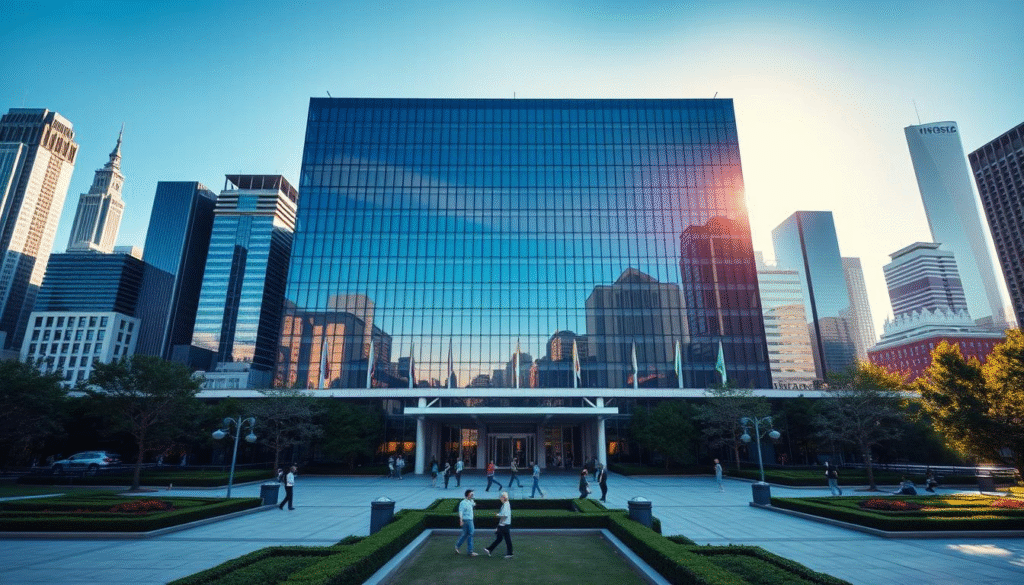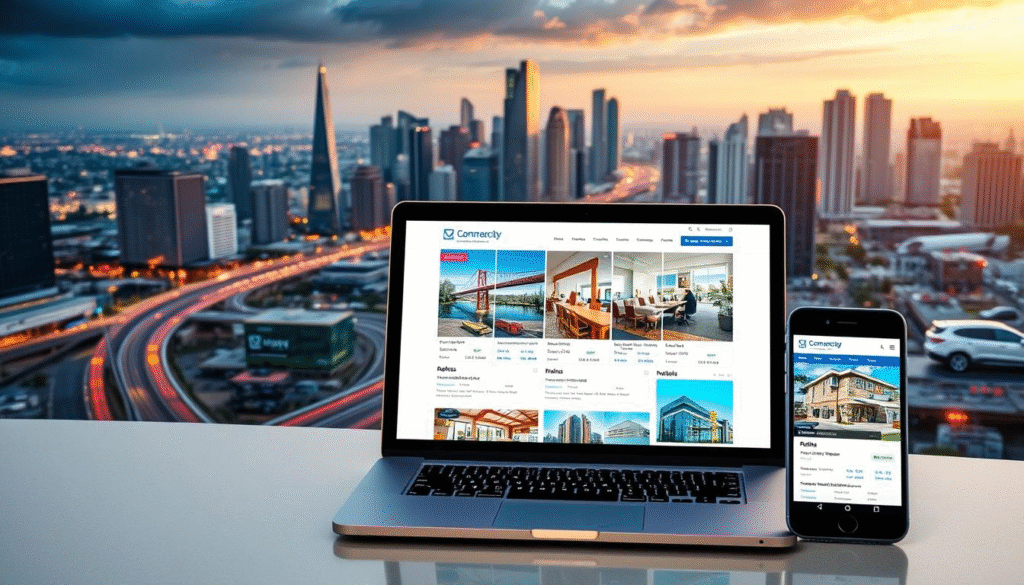Toronto’s commercial real estate market is booming. It offers a wide range of services for property owners, investors, and occupiers, as CBRE reports.
Finding the right business space is key to success. With so many choices, it can be hard to know where to start.

The right location can boost a business’s visibility and reach. This can greatly impact its success.
Key Takeaways
- Understanding the local commercial real estate market trends.
- Identifying the key factors in evaluating a business space.
- Strategies for securing the perfect commercial property.
- Insights into Toronto’s commercial property landscape.
- Tips for navigating the process with confidence.
Understanding Commercial Property Types
The commercial property market offers many options for businesses. These properties are divided into several types, each meeting different business needs.
Office Spaces: From Traditional to Co-Working
Office spaces are key in the commercial market. They range from traditional offices to modern co-working spaces. Co-working spaces are popular for their flexible, collaborative settings. Key features include:
- Location and accessibility
- Building amenities and infrastructure
- Flexibility in lease terms
- Technology and connectivity
Retail Properties: Storefronts and Shopping Centers
Retail properties are vital for businesses needing foot traffic. Retail space leasing focuses on:
- Foot traffic and customer demographics
- Competition and market saturation
- Lease terms and rental rates
- Visibility and signage opportunities
Industrial Properties: Warehouses and Manufacturing Facilities
Industrial properties are key for production, storage, and distribution. Industrial property for sale or lease offers:
- Strategic locations near transportation hubs
- Sufficient space for operations and storage
- Compliance with zoning regulations
- Amenities and infrastructure for efficient operations
Commercial Land for Development Opportunities
Commercial land for development is a chance for businesses and investors. Considerations include:
- Zoning and land-use regulations
- Accessibility and visibility
- Environmental and site conditions
- Potential for future growth and development
Mixed-Use Developments
Mixed-use developments combine office, retail, and residential spaces. They offer:
- Diverse amenities and services
- Enhanced foot traffic and visibility
- Potential for synergies between different businesses
- A vibrant, dynamic environment
Knowing about these commercial property types is key for businesses to make smart real estate choices.
Assessing Your Business Needs
Before you start looking for commercial property, it’s key to know what you need. This will help you find a place that fits your business now and can grow with you.
Space Requirements and Growth Projections
First, figure out how much space you need. Think about your team size, what you do, and any special needs like storage or meeting rooms. Also, think about how big you’ll be in a few years. This will help you decide if you need a big space or a short-term lease.
Location Considerations for Your Industry
The place you choose matters a lot. For shops, being in a busy area is key. For offices, being near public transport and amenities is important. Industrial places need to be close to transport hubs.
Budget Constraints and Financial Planning
Setting a budget is a must. Think about the rent or buying price, plus extra costs like utilities and taxes. Plan your finances well, looking at different ways to pay and understanding lease types.
Timing Your Commercial Property Search
When you start looking can affect what you find. Knowing the market and planning well can get you a good deal. Also, think about how long it takes to move in and if it fits your business plans.
| Business Needs | Key Considerations |
| Space Requirements | Team size, operational needs, growth projections |
| Location | Industry-specific needs, accessibility, foot traffic |
| Budget | Rent/purchase price, utilities, maintenance, property taxes |
| Timing | Market conditions, lead time for move-in |
The Commercial Property Market in 2023
In 2023, the commercial property market is changing fast. Economic shifts, new tech, and changes in the workforce are leading this change. It’s key to know these trends to understand the industry.
Current Trends in Commercial Real Estate
CBRE reports show a big jump in demand for flexible office spaces. There’s also a growing interest in green buildings. The rise of online shopping is boosting the need for warehouse rentals, mainly near big transportation hubs.
Industry experts say there’s a big move towards mixed-use developments. These combine homes, offices, and shops to create lively areas.
Regional Market Variations Across the United States
The commercial property market varies a lot across the U.S. Big cities like New York and San Francisco are popular. But, secondary markets are becoming more attractive because of their better business environments and lower costs.
- Austin and Denver are growing fast, thanks to their booming tech scenes.
- Boston is seeing more demand for commercial spaces because of its strong healthcare and education sectors.
Impact of Remote Work on Office Space Demand
Remote work has changed how we need office spaces. Some companies are downsizing, while others are creating more flexible, collaborative work areas.
“The future of office space is not about eliminating the need for physical offices but about reimagining how they are used,” according to a CBRE report.
Emerging Opportunities in Warehouse Rentals
The rise of e-commerce has led to a big increase in demand for warehouse space. This is true for areas with good logistics. Investors and businesses are taking advantage of this by buying modern, well-located warehouses.
Key factors for warehouse rentals include being close to transport and needing efficient, modern storage solutions.
Finding Commercial Properties: Search Strategies
Looking for commercial properties requires smart strategies. In a competitive market, the right approach is key.
Working with Commercial Real Estate Brokers
Working with commercial real estate brokers is a smart move. They know the market well and can find properties that fit your needs. CBRE says brokers can also access listings not available online and guide you through deals.
Benefits of working with brokers include:
- Access to a broader range of properties
- Expertise in market trends and pricing
- Negotiation skills to secure favorable terms
Online Platforms for Commercial Property Listings
Online platforms are essential today for finding commercial properties. Sites like LoopNet and CoStar list properties for sale or lease. You can filter by location, type, and price.
Online platforms make searching easier. They save time by gathering listings in one place.

Networking and Off-Market Opportunities
Networking can reveal off-market properties not listed online. Going to industry events, joining clubs, and talking to other business owners can lead to great leads.
Off-market opportunities can offer:
- Less competition for desirable properties
- Potential for better pricing due to reduced market exposure
- More flexibility in negotiations
Attending Commercial Property Showcases and Open Houses
Visiting showcases and open houses lets you see properties in person. You can talk to owners or reps about the details.
This is great for office space for rent. It helps businesses see if a space fits their needs.
Evaluating Commercial Properties
Choosing a commercial property requires looking at many factors. These factors can affect your business’s success. Whether you’re searching for industrial property for sale or looking at retail space leasing, a detailed evaluation is key.
Location Analysis and Accessibility
The location of a commercial property is very important. It’s essential for employees, customers, and suppliers to get there easily. Think about how close it is to public transport, highways, and other businesses.
- Proximity to customer bases or target markets
- Accessibility for employees and suppliers
- Visibility and foot traffic for retail properties
Building Infrastructure and Amenities
The state of the building’s infrastructure matters a lot. Look at the property’s age, any recent updates, and if it has the right amenities. This includes parking, security, and modern tech.
- Check the building’s condition and any repairs needed
- See if there’s enough parking and loading docks
- Look for amenities like break rooms or fitness centers
Zoning Regulations and Permitted Uses
It’s important to know the local zoning rules and what uses are allowed. Not following these can cause big legal and financial problems.
- Check the property’s zoning classification
- Make sure your planned use is allowed
- Find out about any zoning changes or updates
Environmental Considerations and Inspections
Environmental factors can greatly affect a property’s value and cost. It’s important to do thorough inspections.
Common Environmental Issues to Watch For
- Presence of hazardous materials like asbestos or lead paint
- Soil contamination or groundwater issues
- Compliance with environmental regulations
Professional Inspection Checklist
A detailed inspection should cover:
- Checking the building’s structure
- Looking at electrical, plumbing, and HVAC systems
- Testing for environmental contaminants
By carefully looking at these points, businesses can make smart choices when picking a commercial property. This helps ensure it meets their needs and supports their success over time.
Understanding Commercial Property Leases
Knowing how commercial property leases work is key to smart business decisions. These leases can greatly affect your business’s success and finances.
Lease Types: Gross, Net, and Modified Gross
There are different types of commercial property leases. A gross lease means you pay one rent and the landlord handles other costs. On the other hand, a net lease makes you pay a base rent plus some property expenses.
A modified gross lease is a mix. You pay a base rent and some extra costs, but not all. Knowing these lease types helps with budgeting.

Key Terms and Clauses to Negotiate
When you sign a commercial lease, it’s important to talk about key terms. These include rent increases, subleasing, and ending the lease early. These can protect your business.
“The most successful businesses are those that negotiate leases that align with their operational needs and financial capabilities.”
Lease Duration and Renewal Options
The length of a lease and renewal options are important for planning. Leases can be short or long, and renewal options can offer stability.
- Short-term leases offer flexibility.
- Long-term leases can provide rent stability.
- Renewal options ensure continuity.
Common Pitfalls to Avoid in Retail Space Leasing
Retail leasing has its own challenges, like hidden costs and restrictive rules. Knowing these can help you lease better.
Hidden Costs and Fees
Hidden costs can hurt your profits. Always check the lease for extra expenses.
| Hidden Cost | Description |
| Maintenance Fees | Costs associated with maintaining the property. |
| Utility Charges | Expenses for electricity, water, and other services. |
| Parking Fees | Costs for parking facilities, if applicable. |
Restrictive Clauses
Some clauses can limit your business. For example, rules on subleasing, signage, or property changes.
Understanding commercial property leases helps businesses make better choices and avoid problems.
Commercial Property Purchase Considerations
Buying the right commercial property can change a business for the better. But, it’s important to know what to consider. Whether you’re looking at industrial property for sale or office space, there are key steps to follow.
Financing Options for Commercial Real Estate
Financing is a big deal when buying commercial real estate. Businesses have many options, like bank loans, SBA loans, and alternative lenders. Each has its own benefits and drawbacks, like different rates and terms.
Due Diligence Process for Industrial Property for Sale
The due diligence process is key for industrial property for sale. It means checking the property thoroughly, looking at its history, and checking for environmental risks. It’s smart to get experts like inspectors and environmental consultants to spot any problems.
Working with Commercial Property Attorneys
Having a commercial property attorney is essential. They help with the legal side of buying commercial real estate. They can look over contracts, negotiate, and make sure everything follows the law, protecting your interests.
Tax Implications of Ownership
Knowing the tax implications of owning commercial property is important for planning. This includes:
- Depreciation benefits that can lower taxable income
- Property tax considerations that vary by location
Depreciation Benefits
Depreciation lets businesses write off the property’s cost over time. This can lead to big tax savings.
Property Tax Considerations
Property taxes are another big factor, as they can change a lot based on where the property is. Knowing these costs is key for planning your budget and finances.
Effective Commercial Property Management
Managing commercial properties well needs a mix of planning and daily care. This way, properties stay in good shape and make the most money.
Professional Management Services vs. In-House Management
Property owners must choose between hiring pros or doing it themselves. Professional management services offer skills and tools to improve property value. On the other hand, in-house management lets owners have full control.
| Aspect | Professional Management Services | In-House Management |
| Expertise | Highly experienced professionals | Dependent on owner’s expertise |
| Cost | Service fees apply | Staffing and operational costs |
| Control | Less direct control | Full control |
Maintenance and Upkeep Responsibilities
Keeping commercial properties in good shape is key. This means regular checks, quick fixes, and updates. Good maintenance stops big problems and keeps tenants happy.

Tenant Relations and Retention Strategies
Good relationships with tenants lead to renewals and positive feedback. This includes quick replies, flexible deals, and amenities that tenants want. Tenant retention saves money compared to finding new ones.
Maximizing ROI Through Effective Management
To make the most money, managers must balance income and costs. This means smart lease deals, low vacancies, and controlled expenses. Good management is essential for a high return on investment.
Preparing for Move-In and Setup
Getting ready to move into your new office or warehouse needs careful planning. A good move-in plan helps you transition smoothly and keeps your business running smoothly.
Space Planning and Design Considerations
Good space planning is key to making the most of your new space. Think about how your workflow, employee comfort, and customer access will be affected.
- Assess your business needs and growth projections.
- Optimize the layout to enhance productivity.
- Incorporate branding elements into the design.
Renovations and Tenant Improvements
Renovations and improvements can make your space fit your business perfectly. It’s important to work with skilled contractors and designers to make your vision real.
Key considerations include:
- Budgeting for renovations and improvements.
- Ensuring compliance with local building codes and regulations.
- Planning for possible disruptions during the renovation.
Utility Setup and Service Providers
Setting up utilities and choosing service providers is a big step. You’ll need to arrange for electricity, water, internet, and more.
Moving Logistics for Businesses
Coordinating your move involves packing, transporting, and unpacking. A detailed moving plan is essential for a smooth transition.
Timeline Planning
Creating a timeline for your move is vital. It helps you stay on track and avoid downtime. Identify important milestones and deadlines to guide your planning.
Minimizing Business Disruption
To reduce disruption, consider moving during off-peak hours or in phases. Keeping your employees and stakeholders informed is also key.
Conclusion: Securing Your Ideal Commercial Space
As businesses grow, finding the right commercial property is key. This journey needs careful planning and a deep look at each option. It’s about finding a space that fits your business perfectly.
We’ve looked at many parts of commercial real estate in this guide. We’ve talked about different types of properties and how to check them out. It’s important to know what your business needs, understand market trends, and deal with lease or purchase details.
- Assess your business needs and growth projections.
- Understand the different types of commercial properties available.
- Evaluate possible properties based on location, infrastructure, and zoning rules.
- Negotiate lease or purchase terms that match your business goals.
By following these steps and using what you’ve learned, businesses can make smart choices. Good commercial property management is key to making money and keeping your business strong for the future.
In short, finding the best commercial space needs a detailed plan. It’s about meeting your current needs while thinking about the future. This way, businesses can build a solid base for growth and success in the commercial real estate world.
Sources
For more insights into the commercial property market, check out these resources. CBRE’s research reports dive deep into trends and market dynamics in commercial real estate.
Visit CBRE Insights for detailed reports on the commercial property sector.
Other valuable sources include industry publications and market analysis from the National Association of Realtors and Urban Land Institute.
These resources offer a lot of information for businesses and investors. They help navigate the complex world of commercial real estate.
FAQ
What are the main types of commercial properties?
Commercial properties include office spaces, retail, and industrial areas. There’s also land for development and mixed-use projects.
How do I determine the right commercial property for my business?
Think about your business needs. Consider space, growth, location, budget, and when you need it.
What are the current trends in the commercial property market?
Trends include remote work changing office needs and warehouse demand. Regional markets also vary across the U.S.
How can I find the right commercial property?
Use brokers, online listings, and network for deals. Attend showcases and open houses too.
What factors should I consider when evaluating a commercial property?
Look at location, building, zoning, and environmental factors. These are key to making a good choice.
What are the different types of commercial property leases?
Leases come in gross, net, and modified gross types. Each has its own rules and terms.
What are the key considerations for purchasing commercial property?
Consider financing, due diligence, and legal advice. Also, understand the tax side of ownership.
How can I effectively manage my commercial property?
Choose between managing it yourself or hiring pros. Handle maintenance, tenant relations, and aim for high ROI.
What steps should I take when preparing for move-in to a new commercial property?
Plan your space, consider renovations, set up utilities, and manage the move logistics.
What are some common pitfalls to avoid in commercial property leasing or purchasing?
Watch out for hidden costs, restrictive clauses, and not negotiating important terms.
How does commercial property management impact ROI?
Good management boosts ROI through smart maintenance, keeping tenants, and improving property performance.
What is the significance of zoning regulations in commercial property?
Zoning rules decide what you can use a property for. It’s vital to know these when looking at properties.
How do environmental considerations affect commercial property?
Environmental issues like contamination or natural hazards can greatly affect a property’s value and use.
